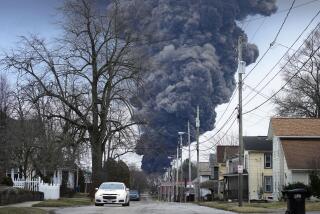Danger on the Rivers
- Share via
Is the Rhine dying? No one is sure. The extent of a spill of toxic chemicals from a Swiss plant into this vital European waterway may not be known for days or weeks, let alone the long-term effect on fish life or drinking-water supplies.
Could it happen on the Mississippi, the Delaware or even the Sacramento?
Absolutely, U.S. environmental experts say. In fact, the one certainty about such technological/environmental accidents is that they are inevitable. Consider in the past two years alone: Bhopal, Chernobyl and, now, the Rhine.
Can such accidents be prevented? Possibly. Can their effects be controlled? Certainly. The Swiss spill occurred after fire struck a riverside storage building. About 30 tons of agricultural chemicals were flushed into the river by water used in fighting the fire. One report claims that the building was not equipped with fire alarms or automatic sprinklers. If so, such safety lapses can and should be corrected.
The Swiss acknowledge that a misunderstanding resulted in a delay of up to 24 hours in notifying West German, French and Dutch officials of potential disaster floating toward them. An immediate alert could have given downstream interests more time to cope with the problem, including the cutoff of water supplies from the river. Switzerland’s neighbors, of course, were outraged. How many houses have burned down because the homeowner thought that he could handle the situation without calling the fire department?
Presumably such a delay would not occur in this country. Federal and state laws require an immediate alarm, allowing for activation of emergency response systems.
And the danger of a Rhine-like accident is not nearly so great in California, because the state does not have such a heavy concentration of industry along a major fresh-water stream. But a California official noted that freight trains repeatedly have derailed alongside the Sacramento River in Northern California. If the train is loaded with hay, that is one thing, the official said, but what if the train is carrying toxic chemicals? The Sacramento is a source of drinking water for millions of Californians.
The Rhine spill demonstrates again the need for constant vigilance by industrial officials and governmental authorities in preventing and containing environmental disasters. Above all, the lesson is that once an accident is out of control, someone must have the courage to sound the alarm and call for help.
More to Read
Sign up for Essential California
The most important California stories and recommendations in your inbox every morning.
You may occasionally receive promotional content from the Los Angeles Times.













